Tags
#EmmaLazarus, #FolgerShakespeareLibrary, #RitaDove, Dante, dversepoets, poetry, poetry prompt, Pompeii, Shelley, Wall Poems
Welcome, one and all, to the Poets Pub for a round of Poetics! I’m Dora from Dreams from a Pilgrimage and I’d like you to ponder with me just now that titular idiom which implies a permanence when words are set in stone that no other material seems to give. But . . .
. . . before we get started, a REMINDER:
This coming Saturday, February 17, from 10 A.M. to 11:30 A.M. (EST) is dVerse LIVE! and Sanaa will be hosting. This will be open to anyone who wants to listen or read their poem or someone’s poem or sharing of a poem that one likes. It does not have to be the poem shared during OLN this Thursday — it can be any poem that they have written or read. OLN will have an optional prompt as is our new custom.
Oh, the temptation! There you are, walking along, and suddenly, right there before you, a patch of newly paved sidewalk, the cement still pliable and soft. Soft enough to . . . WRITE ON! What do you do? What CAN you do? Your muse is screaming. And you? Well, you’re only HUMAN.
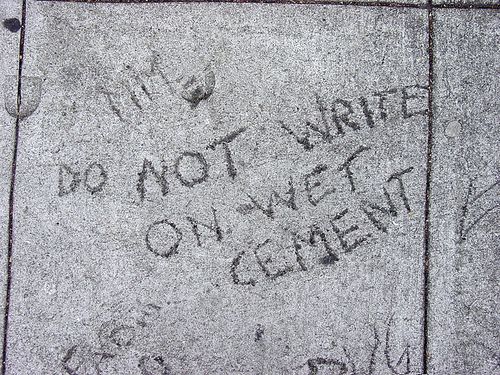
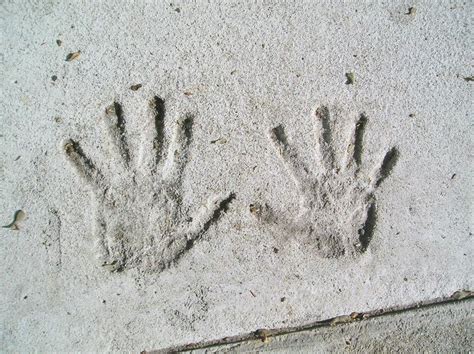
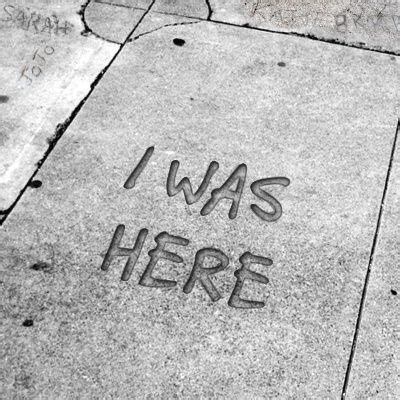
From the beginning of history and beyond, we’ve wanted to leave our mark on the world around us, to tell our stories, to point to our discoveries about life from the mundane to the sublime.
The earliest civilizations have left us clay or stone tablets of cuneiform, pictographs, and hieroglyphs recording such things as cattle counts or grain measures to a monarch’s edicts and laws to oracle inscriptions cryptically rendered. The not-so-cryptic and ubiquitously known Ten Commandments of the Torah and Old Testament were first written on tablets of stone around 1500 B.C.
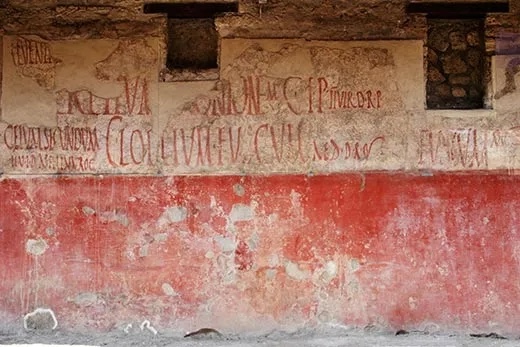
Even after more portable skins and papyrus and scrolls of paper were in use, we still continued to write on stone so that the well-preserved walls of Pompeii (79 A.D.), for example, speak of the flourishing of graffiti in the ancient world.
I’m amazed, O wall, that you have not fallen in ruins, you who support the tediousness of so many writers.
epigram taken from a wall in Pompeii (Taylor and Baird, eds., Ancient Graffiti in Context (2010) qtd. in Smithsonian Magazine, 2010) (source)
The 2nd century A.D. “Song of Seikilos” is a seventeen-word poem which survives inscribed in six rows of elegant Greek uppercase letters on a cylindrical marble column.
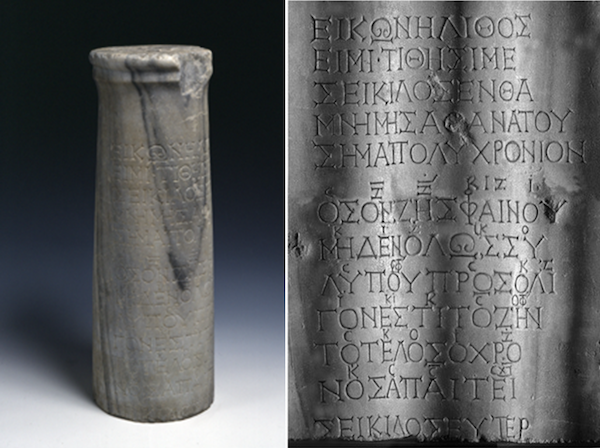
An English rendering with the same number of syllables (i.e. an isosyllabic translation) is as follows:
While you live shine bright:
trans. qtd. by Armand D’Angour in “The Song of Seikilos: a Musically Notated Ancient Greek Poem” (source)
Don’t let sorrow you benight;
We don’t have life for long, my friend:
To everything Time demands an end.
Our gravestones promise us immortality, even if it is only our names that are recorded. Mary Shelley (author of Frankenstein) learned her alphabet from visiting the graveyard where her mother lay, tracing the letters on the stone with her childish fingers. Her husband wrote a poem in which a “lone traveler” tells of a great king who had his visage carved, immortalizing in stone these words of invitation on its pedestal:
My name is Ozymandias, King of Kings;
“Ozymandias,” Percy Bysshe Shelley (1818) (source)
Look on my Works, ye Mighty, and despair!
Nothing beside remains. Round the decay
Of that colossal Wreck, boundless and bare
The lone and level sands stretch far away.”
Indeed the irony is boundless as well.
The great medieval Italian poet Dante Alighieri in the Inferno, walks with Virgil down the “savage way” to hell and comes upon these welcoming words “inscribed over an archway”:
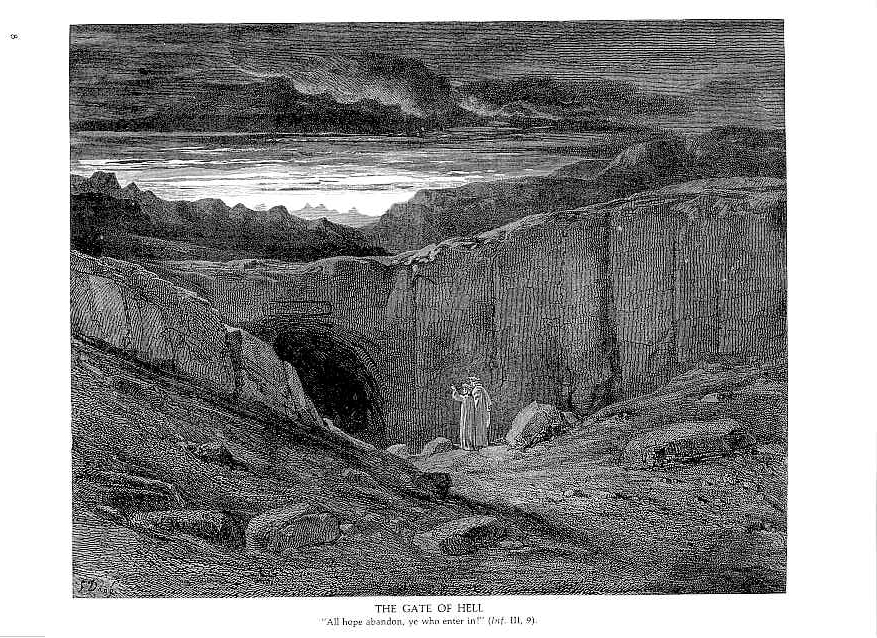
THROUGH ME THE WAY TO THE CITY OF WOE,
Divina Commedia (The Divine Comedy) – tr. Hollander – Cantica I – Canto iii (source)
THROUGH ME THE WAY INTO ETERNAL PAIN,
THROUGH ME THE WAY AMONG THE LOST.
JUSTICE MOVED MY MAKER ON HIGH.
DIVINE POWER MADE ME,
WISDOM SUPREME, AND PRIMAL LOVE.
BEFORE ME NOTHING WAS BUT THINGS ETERNAL,
AND I ENDURE ETERNALLY.
ABANDON ALL HOPE, YOU WHO ENTER HERE . . .
Inscribed on the Statue of Liberty’s pedestal entrance in New York harbor is Emma Lazarus’s Petrarchan sonnet, “The New Colossus” (1881) which most famously welcomes its immigrants and newcomers, especially Jews fleeing pogroms in Eastern Europe, with the words:
Give me your tired, your poor,
excerpt from “The New Colossus” by Emma Lazarus (source)
Your huddled masses yearning to breathe free,
The wretched refuse of your teeming shore.
Poetry inscriptions written in many languages can be found on the walls of detention barracks on Angel Island where Asian immigrants entering the United States were often forced to stay. Where welcome was expected, these poems instead speak of their writers’ “frustration, fear, and anxiety.” (source)
All of which leads us to this feature of our human expression finding its way on to stone at Washington, D.C.’s Folger Shakespeare Library (which houses the world’s largest Shakespeare collection) and its grounds. After a multi-year renovation project, the Folger will re-open this summer and visitors will find a brand new poem by Rita Dove inscribed on a berm, a “continuous border of marble that wraps around the West garden walkway.” (source) The poem is intended as a welcoming gesture, a promising invitation prior to entering the Folger.
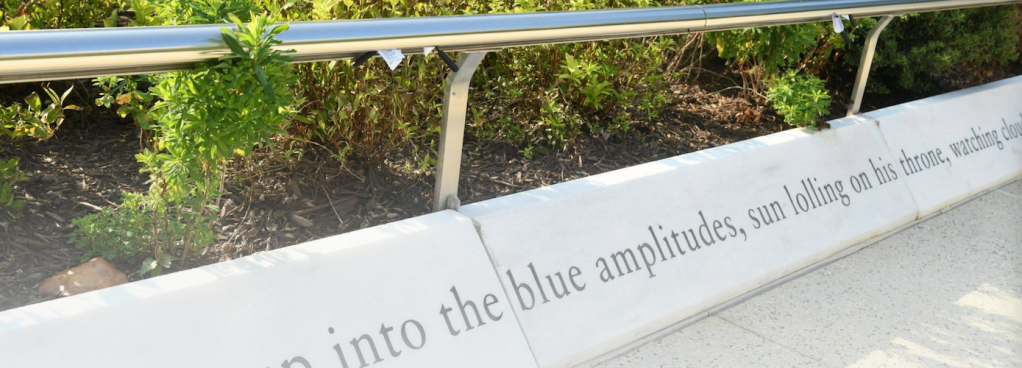
Dove says the challenges of writing a poem to be seen on a low wall are unique:
“To be inscribed in marble, it seems like the words can freeze into the stone. So, the idea is how to—for me—the idea was how do you warm up those words so that they seem to be speaking to you as opposed to either shouting at you or just resting there in peace?” Another challenge is that the poem is heard internally since it’s not meant to be spoken aloud: “And there’s so much that goes on in our interior lives that never reaches the surface, even as we walk into, say, the Folger Shakespeare Library, right? That I wanted to capture that moment when things begin to switch, when one becomes aware of one’s thoughts.” (source)
Clear your calendars. Pocket your notes.
Rita Dove poem for the West Garden Entrance to the Folger; source text and reading here.
Look up into the blue amplitudes,
sun lolling on his throne, watching clouds
scrawl past, content with going nowhere.
No chart can calibrate the hush that settles
just before the first cricket song rises;
no list will recall a garden’s embroidery,
its fringed pinks and reds, its humble hedges.
Every day is Too Much or Never Enough,
so stop fretting your worth and berating
the cosmos – step into a house where
the jumbled perfumes of our human potpourri
waft up from a single page.
You can feel the world stop, lean in, and listen
as your heart starts up again.
Our Poetics challenge is to write a poem, as Dove was commissioned to do, for a walled entrance that addresses and welcomes visitors into a space of your choosing.
As with Dove’s poem, this can be a location existing in physical reality (for the walkway to your home, backyard, neighborhood, woods) or in your metaphysical imagination (for a path leading to an apocalyptic or mythological landscape) or a vision of true love — tomorrow being Valentine’s Day. What if it were an invitation into your own heart to one who would love you?
Or maybe the poem on the walled entrance can address visitors to your favorite author or character’s world or a location as everyday as your office workplace or home workspace, or a place of leisure and relaxation. And here’s a thought: perhaps that visitor may only be you, and your poem is to welcome and reorient yourself into this space.
The poem must be about the length of Dove’s so that it can meet the requirements of such a wall construction and not outlast its reader/visitor’s attention. If necessary, give us a couple of lines prefacing the poem as to what type of space the poem is welcoming us into.
New to dVerse? Here’s how to join in:
• Write a poem in response to this challenge and post it on your blog.
• Link or tag this page in your blog post.
• Enter your name and a link directly to your poem by clicking Mr. Linky below and remember to check the little box to accept the use/privacy policy.
• You will find links to other poets and more will join, so please do check back later in order to read their poems.
• Read and comment on other poets’ work; we do so look forward to each other’s feedback, don’t we?!
• – and ENJOY!!
Note that Mr. Linky remains open till 1 PM (EST) this Thursday.

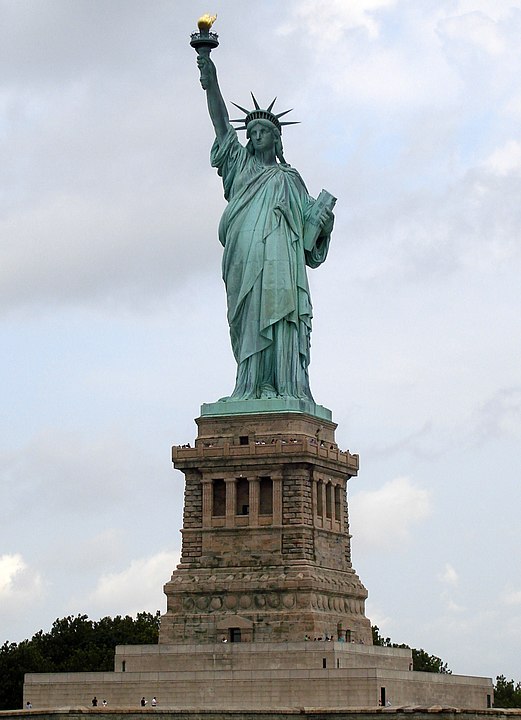

Hello, everyone! It’s TDBV Day — The Day Before Valentine’s Day ❤️ — and an unexpectedly snowy one here in the mid-Atlantic. The snow’s quickly melting now so everyone’s dodging dripping awnings and doorways.
Pub doors are open (watch your head!) — your sustenance is at hand. Come on in and welcome! Can’t wait to read your wall poetry!
Hello, I found the topic easy for me… there is an entrance of particular interest for me.
I think I would like to have something light as a snack … soon bedtime anyway.
I’m snacking on some ginger cookies and willing to share! Loved your poem, Björn, just what I was hoping to see. 😊
HI everyone, and thank you Dora for a challenging prompt. I had so many ideas, but when it came to writing my poem, I fell back on the familiar. I’m glad the snow is melting – we have rain again after quite a difficult day: we took Luna back to the vet for a post-operative check-up and she has an infection that needs antibiotics, and my husband had a hospital appointment which left in a bit of a shock – I won’t go into detail, I look forward to reading all the different writing on the wall.
Sorry to hear you’ve had such difficult news come in with the rain. Will be praying, my friend, and hope the bad turns to good soon.
Thank you kindly, Dora.
Hello everyone! Thanks for this lovely prompt, Dora.
Thank you, Mish. Looking forward to reading your wall poem!
Hi Dora. This was a very interesting prompt and I appreciate all the information before writing the poem. I had to trim what I had to say, as I realized that I was rambling on and on. Currently cold over here in Ontario with falling snow expected on Thursday. A warm cup of chocolate would be lovely. Thanks for hosting.
Thank you! So glad you liked the prompt, Grace, and I enjoyed putting it together. No more snow for us, I don’t think, but then again, we weren’t supposed to get any today. A warm cup of chocolate coming right up, my friend.
Hello, Dora, and thanks for the prompt! Hello everyone. I don’t suppose you have cough drops behind the bar.😅 That’s what I’m living on these days. Nursing this horrible cough. I’ll be headed out to the store to pick some up soon. Perhaps some hot tea for me while I write my poem.☕️
Hot tea coming straightway, Melissa. And cough drops too: if only I could teleport them to you! Looking forward to reading your poetry. Take care of yourself!!
hi dora
hi poets
what an interesting prompt.
time for a soak will head back when clean.
rog
Thanks, Rog! I just read yours and now my head’s full of matchstick people, dogs and cats! Loved it.
Lowry was a superb painter. Thanks
Hello Dora and poetic friends :)We recently returned from travels in southwest U.S. so I share something from our trip. Please pass the ginger cookies to go with my chai tea. Thanks, Dora, for an interesting prompt!
Oh that sounds wonderful and I’m headed over to read. But before I forget, here you go: a plate of ginger cookies, Lynn, and a cup of chai tea!
Great prompt Dora, my link probably isn’t quite to spec but I couldn’t remove it using the Linky cookie removal tool. If you can get to it, could you delete? Thanks – Brendan
I’ll remove it, Brendan, but I hope you will write something for the prompt, for us — Your poetry is always engrossing and stimulating on so many levels.
Hi Dora. Thank you for hosting this evening! What a unique idea for a poem. This is something I never have tought of as I entered places or buildings. I wonder how many actually read what is inscribed there. I think one of the most read would be the 9-11 memorial inscriptions.
I will see what I can come up with. Hot Chocolate and a nutty cinnamon roll would be wonderful.
Nutty cinnamon roll sounds great with hot chocolate. Think I’ll join you! You’re right, of course, the 9-11 memorial is famous as well. I think the list of wall inscriptions is probably endless. Can’t wait to see the wall poem you come up with! 😉
I am still ruminating at this point. :>)
😉
Hi Dora and others. Loved the prompt, Dora and your selection of poems.
Still cold here. I would love a cup of tea this foggy morning.
Good morning, Punam! Here’s a cuppa for you! We had a couple of foggy days over the weekend too and it always makes it harder to wake up, LOL. Loved your poem, Mama Bird. 🥰❤️
Good morning, Dora. Just what I needed. 😊
Believe me, it’s very difficult! 😅
Thanks so much, my friend. 🥰❤️
My pleasure! Have a great day ahead! 🤗💖
Thanks. 😊 I hope you had a restful night. 🤗
I did! 🤗 ❤️
🤗❤️
Thanks for sharing all these wonderful poems Dora. I especially like Rita Dove’s. (K)
So glad you enjoyed them! Thank you! Just read your stunning philosophical piece of poetry, particularly befitting the entrance to the portal you’ve chosen.
So an add here Dora, thanks so much for the prompt. Looking forward to checking the rest. Cheers to all this.
Just read your poem — brilliant! Thanks for taking part in the prompt.
Like Ritas poem, mine is a bit, ‘slant’, although, of course, not as good! 😁
I’m so glad that she was able to inspire you, Kim! You never disappoint so don’t sell yourself short. Heading over your way to read!
Thank you!
Loved the poem, Kim! So glad you joined in the prompt. ❤️
This is a wonderful prompt for me, thank you Dora.
Well, that certainly spurs me all the more quickly to your site to read! 🤗 Thanks, Paul, for joining in.
🙂
You do not disappoint! Loved your invitation into “Saranam.” Give me a moment to catch a plane. Be right over!
Thank you for an interesting and insightful prompt, Dora. Thank you very much for the detailed info. 🙂
That makes me so happy! Hope to see your offering soon. 🤗🩷
I’m very late at the carving-face, and my chisels are blunt, but your prompt is irresistible to me for a re-blog. Forgive me for cheating x
Not cheating when it works! And it does beautifully, Kathy, as a plea to the self at the threshold where you linger in need of grace. Thanks for joining in!
Thank you dear Dora. I have loved your prompt – and your post. Now – having failed to post a comment on your blog about Faure’s Cantique de Jean Racine – I am off out through the threshold into the sunny garden. Love to you x
https://www.hyperion-records.co.uk/tw.asp?w=W18
I’ll have to look it up, thanks, Kathy. Enjoy your beautiful sunny garden!
Listening to just the first minute and oh wow!! Food for the soul. Love it!!!
Hey Dora, just tried to link up but link expired. I have linked to the OLN with a poem written to your prompt.
p.s. I *love* Rita Dove’s poem!
So glad you did, Lisa! 🤗😀
❤
This was hard coming, so I missed the linky by several days, but here’s the pingback. Thank you, Dora, for a very challenging and inspirational prompt.
I don’t know why it separated the link from the comment like that!
Oh how wonderful, Xan! Thank you. I’m so glad you enjoyed it. 😊💖